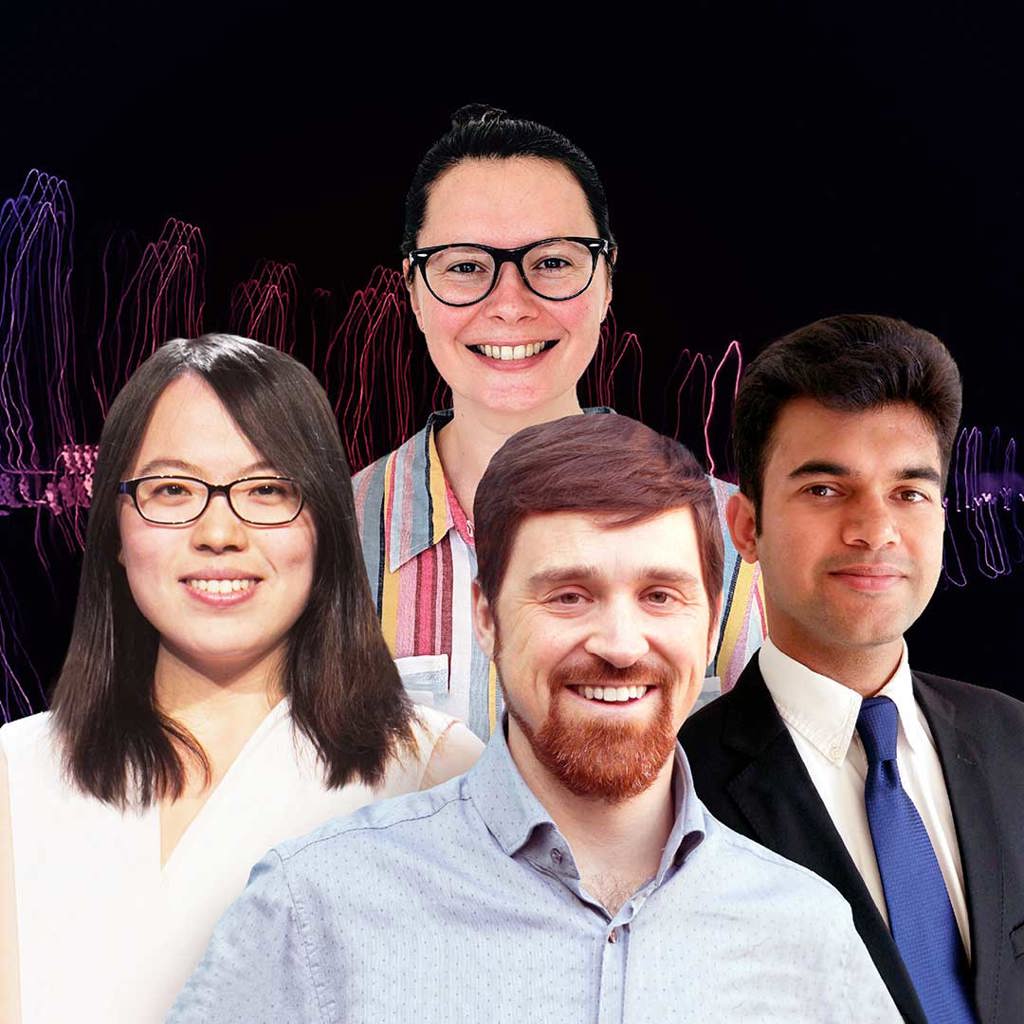Optica Blog
Nurturing Talent
Jennifer Mehltretter, Education Programs Manager, OSA
We Are OSA is a new series of podcasts, blogs and articles featuring inspirational stories from scientists & engineers. In this We Are OSA podcast, OSA Ambassadors share how they inspire & mentor optics & photonics students across the world.
Transcript
Gabrielle Thomas: Photonics is the study of light and how light interacts with its surroundings.
Amol Choudhary: Light can be a particle and a wave at the same time, which was quite fascinating.
Mengjie Yu: It enables us to look at this world differently.
Chad Husko: I just think, the application's a lighter, just crazy,
Gabrielle Thomas: This can be everything from understanding climate change to understanding how medicines interact with groups of cells.
Amol Choudhary: My belief is, this is the century of photonics.
Mengjie Yu: I do have a dream that in the future, you can say the role of light is just to light things up.
Chad Husko: I mean, it's infinity. Right?
Megan Nadolski: Welcome to the, we are OSA podcast, a new series, featuring inspirational stories and perspectives from scientists and engineers improving the world.
I'm your host, Meghan Nadolski. In this episode, we talked to four OSA ambassadors about their careers. Through the OSA ambassador program they've mentored and inspired optics and photonics students all across the world. These are some of the emerging leaders in optics and photonics.
Gabrielle Thomas: I'm Gabrielle Thomas. I am an innovation ambassador for a company called M squared, M squared is a photonics and quantum technology company based in Scotland in the UK.
But we now are moving into fields like quantum technologies, biophotonics and chemical sensing, so I find myself with many different hats on talking to many, many different people about all of the different, fun, and new applications in these areas.
Amol Choudhary: My name is Amol Choudhary and I am an assistant professor of electrical engineering at the Indian Institute of technology Delhi in India.
But what I'm trying to make is a faster internet. You will be able to watch videos faster and at a cheaper cost.
Mengjie Yu: I’m Mengjie Yu, currently a post-doc fellow from Harvard university and my research area is in integrated nonlinear photonics. Basically you can understand we manipulate colors of light at a very small scale and the goal of our field or my research specifically it's really to shrink all those optical benches or tables or machines or lasers into a very small, small device, which can actually fit, for example, only your fingertips and fits in your pocket.
Chad Husko: My name is Chad Husko. I was a scientist before I was an entrepreneur, so a scientist turned entrepreneur, I'm the founder and CEO of Iris light technologies. So our mission is to basically just put light chips in every pocket. We want to make that smartphone even better, even more functional, even more affordable and have all the power of optics in your pocket.
Megan Nadolski: Through their introductions it sounds as if these leaders were on a set path from the beginning, but they'll tell you that finding one's way in the field of optics and photonics is not easy.
Chad Husko: I mean, when you're doing a PhD, there's just a strong disconnect, you're working with an academic who very typically doesn't have a connection to the industrial world at all.
Mengjie Yu: The environment is most of the time, I will say very frustrating and there's a lot of challenges along the way.
Gabrielle Thomas: I think for me coming from a sort of a less privileged background, I didn't have any role models. I didn't have anyone in my immediate network from home who had gone on to do a PhD or had a PhD.
And so for that, I guess I had a little bit of imposter syndrome that, you know, maybe a PhD is not right for someone like me.
Amol Choudhary: There was a time where, in six months I actually moved to three different institutions, so that, that takes a lot of adapting. But I always found it challenging to, you know, get to a new place, understand the place, every place has its own culture.
Megan Nadolski: Chad, Amol, Gabrielle, and Mengjie each face, their own struggles early in their education and career. Mengjie remembers a time in particular when she thought she might give up on the field of optics and photonics altogether.
Mengjie Yu: So I start my fourth year of my PhD, I did not achieve anything in the first few years, I was very anxious. I couldn't sleep at night because I think photonics might not be my expertise. Maybe I just cannot do a good job here. So maybe I should switch my research directions by, by changing to another research group. The research scientist at my lab came to talk to me because he noticed my emotions are not very stable while working.
He spent like three hours just talking through my personal frustration and all of the research difficulties I have encountered. He tells me that he thinks I have a lot of potential if I just continue a little bit further and that he believed in me and that I can make a bigger difference in this group, and he really hopes that I can stay because he really thinks I can do more. That conversation really, I will say really changed the path of my life.
That's the first time I realized that we have a very powerful community around us that could connect each other together. That interaction OSA really boosted my confidence in doing research
Megan Nadolski: OSA has helped all of these members during the challenges they faced in their studies and in their careers for Mengjie it's a confidence boost, for Amol OSA gave him a constant when all of his surroundings kept changing.
Amol Choudhary: The nice thing about OSA is it’s a global organization. So it doesn't matter where I'm at, I still have access to all the benefits. For example, if I want to access a paper, you can access it from anywhere. If I want to attend a conference, they're always good conferences near us.
Megan Nadolski: For Gabrielle, what drew her into OSA and made her want to be a part of it was its accessibility.
Gabrielle Thomas: OSA's kind of range of traveling lectures that they had was really, really extensive. And so, I started going to these, these lectures, and I started getting, doing a little bit of networking with some of the, the student chapter members.
And what was really great is that they had kind of a recruitment drive on at the time, and so we had a discounted membership fee and, you know, any discounts like that are extremely valuable. So the fact that the OSA had made this available just seemed like they were a society, for good, in terms of the career trajectory for people.
Chad Husko: The spark moment really, where I really became deeply involved with OSA was that I was on one of these conference committees.
Megan Nadolski: And Chad, he enjoyed the ease with which senior and relatively new members from around the world could interact and share ideas.
Chad Husko: So I think that's the biggest value is just being able to be in the room, being able to just talk to the people that are the decision makers.
Megan Nadolski: It was because of positive experiences like this, that Gabrielle, Amol, Mengjie and Chad decided to become OSA ambassadors. In fact, Chad Husko was in the very first class.
Chad Husko: Honestly, I don't know how I made the first class of ambassadors, if I'm honest. If I look at who my peers were, because it was the first class they can pull from the rockstars of the past decade. So people that were on our first class were like, the people who started the student conferences.
Megan Nadolski: Chad remembers that first-class really being the ones to define the OSA ambassadors role and mission.
Chad Husko: The ambassadors were our facilitators and this was created to, you know, link, because we usually have connections both to the senior researchers and kind of like these junior researchers and students we’re able to bridge that gap and communicate between those two worlds.
So that was, one of the reasons, among many, why this role was created. And it's also to, to elevate early career researchers
Megan Nadolski: While Chad was in the very first class, Mengjie was in the most recent. The mentor that talked Mengjie out of quitting her research? He later became an OSA ambassador, and this is what inspired Mengjie to apply as well.
Mengjie Yu: I think it’s a great honor for me that I can follow his path. And the meaning of being an OSA ambassador, I think, is to give your experience, your experience will help the younger generation to go.
Megan Nadolski: Each new class of ambassadors embraces the same sense of purpose.
Amol Choudhary: So, it's, you know, paying it forward. I hope. I mean, they will have the others, so that's how things go. Right?
Chad Husko: And you know, it's really just this iterative loop, right. That's how we always get better.
Megan Nadolski: One incredible example of this iterative loop that OSA ambassadors engage in is their visits to student chapters around the world where they give lectures and meet one-on-one with students,
Gabrielle Thomas: The OSA is really supportive of the scheme. They provide us with funds to be able to, visit student chapters across the world. So, after becoming an ambassador I think that it has kind of provided me with a louder voice. So now I get a lot of invitations to go and speak all across the world, and it allows the students to gain deeper insights from a really wide range of different people.
Mengjie Yu: As a researcher, you mostly stay in the lab by yourself. Your interaction is always within the group. But by taking a professional leadership role in the society, you can make a bigger contribution and bigger influence to more people. You know, maybe not in your country, but internationally.
Megan Nadolski: These ambassadors found themselves visiting student chapters everywhere. From major metropolitan areas to small villages, truly embodying the idea that science is borderless.
Chad Husko: I went off to places that, you know, they just don't get visited by anybody.
Mengjie Yu: So I have already visited, seven different student chapters all around the world, for example, United States, Singapore, Germany and New Zealand.
Gabrielle Thomas: I traveled throughout the UK actually. I went to Exeter, I went to London and to Oxford.
Chad Husko: Quebec city, and then visited some student chapters in Australia, up in Brisbane.
Amol Choudhary: I wanted to focus around India. There are a lot of chapters in India.
Gabrielle Thomas: I also went to Poland. I went locally here in Germany as well. And then towards the end of the year, I went to Singapore and Indonesia.
So when I went to Indonesia, what I really appreciated was the one on one time that I had with, with the student chapter there. But they wanted to be able to explain to a broad audience, to the public, about what it is that they're doing, what it is that they're learning and the kind of technologies that they're developing as part of their masters or their PhDs.
Megan Nadolski: Not only do the student chapters benefit from these visits, but these interactions also leave lasting impacts on the ambassadors.
Gabrielle Thomas: And so that engagement with them, for me, was super valuable because it gave me new insights into, very localized needs of the students there.
Mengjie Yu: I will have to say it's very important because I think science comes out when everybody feels comfortable, feels respected, and feels they can openly and generally talk about their opinions together. That cannot be achieved if we cannot embrace many people all together.
Amol Choudhary: So every time I go to student chapters, I talk to them, hear from their perspective, because they've got some really creative and interesting perspectives to give,
Chad Husko: The most important thing is to be able to have the conversation. Being anointed with this role and, living up to the expectations of the role. You're able to have the conversations to move things forward in the world.
Megan Nadolski: After the experience they've had through the OSA ambassador program and in their own careers. Gabrielle, Chad, Mengjie and Amol have some advice for the next generation of emerging leaders in optics and photonics.
Gabrielle Thomas: I still don't know if all of the questions I have about my career have been answered. After my PhD I worked for a startup and then I went back to academia and now I'm working for a medium sized company. The decisions I made immediately after finishing my PhD has not dictated what I have done in the rest of my career.
Don't agonize about those decisions, but you learn a lot about yourself by trying out different things, every experience has some value in it.
Amol Choudhary: Well, my advice would be very cliched advice that I've been following: do what you love. If you've come across an opportunity if find it interesting just go for it. And maybe a really silly analogy, but I talk about this suitcase that I need to fill with experience. So, you know, every place I go, I try and fill it up with some new experience and it should help out at a later stage.
Mengjie Yu: Advice for next generation I think is to be confident, and be passionate about where you were doing and find a community of belonging. Think about what you can do now, and what you can do in the future to help more people.
Chad Husko: Take on the volunteer roles, have conversations, learn. The science is interesting, it's amazing, it keeps us in awe. There's so much beautiful images of light in the world and in our daily lives.
Don’t get lost in the problem and just remember the humanity of it all. It's our contribution to society, and just remember that it's valued and that you're valued. We're not just this single problem you work on, you are the bridge.
Megan Nadolski: Now, these OSA ambassadors are looking forward to future opportunities. The ones that will continue the cycle of growing while contributing to OSA.
Chad Husko: When the world goes back to being in person, we're super excited to have our company have a booth at an OSA conference, so we can do some industry outreach.
Amol Choudhary: Uh, I've moved around a fair bit, but now I have this time to, you know, really build things up, build up a group. And, you know, really, as I say, like really carve something, you know, which hopefully I can see the results in maybe not five years, maybe 10 or 15 years. I'm really looking forward to that.
Gabrielle Thomas: One thing that I'm really proud to share is that along with a couple of other ambassadors, I have set up a mentoring scheme.
Mengjie Yu: The program, we are just going to launch next year. It's called OSA mentor match. They're going to match mentors with mentees. Talk about anything, or like your personal, your academic challenges that you had in your life. So they can try to match you with a senior mentor to see whether they can help you even further,
Gabrielle Thomas: Someone external to their immediate lives just to talk to, and I'm really excited to see how that works out.
Megan Nadolski: These OSA ambassadors from all over the world are continuing to work towards the future of the science of light and what they see is bright.
Mengjie Yu: For any person to confide instructions in any study, so the idea of inclusive education. That way we can follow all the interests across, across genders, across races background. Then it gives us hope.
Chad Husko: Telecommunications, inside data centers, all of our cloud, 95% of the cloud lives inside of a data center now. And that is where the most traffic is growing. It's just inside the data center, computers talking to each other.
Amol Choudhary: Send information over light. So what you do is you take this information and you can encode it on a laser beam. You switch your light on or off with ones and zeros and you can communicate it over these devices that we call an optical fiber. Which, you know, you can transmit.
Gabrielle Thomas: Using lasers on satellites or that the ability to use lasers on satellites to scan a very, very large area of agricultural fields, for example, and to try to ascertain health information about the crops that are growing there. And this can basically help us to better use our resources and to increase our crop yields.
Amol Choudhary: Even though, you might not think it's everywhere, but it really is, and it's underpinning a lot of the current technologies, so that's what fascinates me the most.
Megan Nadolski: Thanks for listening to the, we are OSA podcast special. Thanks to the voices on this episode for sharing their stories with us. Visit osa.org/WeAreOSA over the next few months. To hear other episodes and read insightful articles.

We Are OSA Podcast, Episode 1
This podcast explores the personal stories of four emerging leaders in optics and photonics and how being part of our community has helped them to develop their careers.
These emerging leaders talk about becoming ambassadors and their passion for sharing perspectives with students and other early career professionals. They provide career advice, technical knowledge and mentorship.
Convening the brightest minds, OSA nurtures talent, develops skills and creates career-advancing opportunities for its global network of 7,000 student members who participate in over 403 chapters in 60 countries.
Supporting Emerging Leaders
The OSA Ambassadors share fascinating stories and recall their roles as mentors for students. Their enthusiasm for encouraging tomorrow’s optics and photonics leaders is evident. Serving as traveling lecturers, Amol Choudhary of Delhi, India, Chad Husko of Chicago, Illinois, USA, Gabrielle Thomas of Berlin, Germany, and Mengjie Yu of Boston, Massachusetts, USA talk about leading professional development training at meetings and engaging with their local communities.
Describing the environment we create, Dr. Mengjie Yu said: “It’s very important because I think science advances when everybody feels comfortable. The students we meet with can openly talk about their opinions. That cannot be achieved if we cannot embrace many people altogether. By taking a leadership role in a professional society like OSA, you can make a bigger contribution and have a bigger influence on more people.”
OSA’s investment in its members, especially its student members, and how we are a champion for career development, training and mentorship, resonated with 2019 OSA Ambassador Dr. Gabrielle Thomas: “As part of my Ambassador year, I went to Poland. I travelled locally here in Germany as well, and then towards the end of the year, I went to Singapore and Indonesia. In Indonesia, I really appreciated the one-on-one time I had with the student chapters. They wanted to be able to explain to the public about what it is that they’re doing, what it is that they’re learning, and the kind of technologies they’re developing as part of their masters or their Ph.D. That engagement with them, for me, was super valuable because it gave me new insights into the very localized needs of the students there.”
The four OSA Ambassadors featured in the Podcast
Dr. Chad Husko is a scientist-turned-entrepreneur and the Founder and CEO of Iris Light Technologies, a nanotechnology company developing a colour-versatile laser for the rapidly growing silicon photonics market. As a 2016 OSA Ambassador, Chad visited student chapters in six countries, where he hosted student and early-career researchers’ sessions to better understand their needs and how OSA could help meet them. Chad regularly sits on professional development and entrepreneurship panels to advance the Society’s mission.
Dr. Gabrielle Thomas is currently Innovation Ambassador for M Squared Lasers in Germany, which involves building innovation networks, spearheading new R&D projects and coordinating the expansion of M Squared’s German subsidiary. She has a Ph.D. in Laser Physics, an MSc in Optics and Photonics and a BSc in Physics, all from Imperial College, London. She has a range of experience working in both academic (universities and research institutes) and industrial (start-ups and SMEs) environments, in fields including remote sensing, attoscience, quantum technology and biophotonics.
In 2016 Gabrielle was named one of the World Economic Forum’s Young Scientists, and in 2019, she was selected as one of the ten OSA Ambassadors for that year. As an OSA Ambassador, Gabrielle visited numerous student chapters across the world, delivering technical talks and professional development workshops to students and early-career professionals.
Dr. Amol Choudhary was also a 2019 Ambassador and is currently Assistant Professor at the Department of Electrical Engineering at the Indian Institute of Technology, Delhi. He works in optical physics in understanding light-matter interactions, including laser physics and nonlinear optics and their applications in high-speed communication networks. Amol has received several awards, including the Doctoral Prize Fellowship from the UK government, the Erasmus Mundus Scholarship from the European Parliament and OSA’s Ivan P. Kaminow Outstanding Early Career Professional Prize.
Mengjie Yu was a 2020 OSA Ambassador and helps to lead global engagement and the growth of our Integrated Photonics Technical Group. Mengjie is the winner of the 2016 Maiman Student Paper Competition, the 2016 Emil Wolf Student Paper Competition and is a Postdoctoral Fellow at Applied Physics in the John A. Paulson School of Engineering and Applied Sciences at Harvard University. Her research areas include optical frequency comb generation in photonic waveguides.




